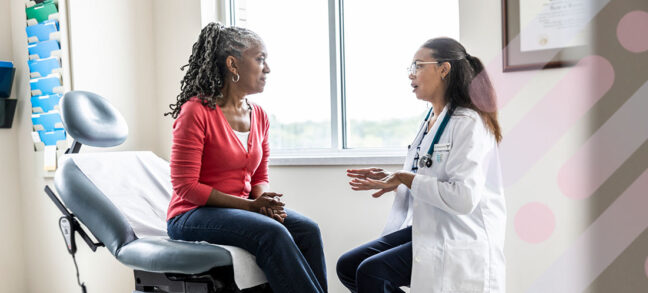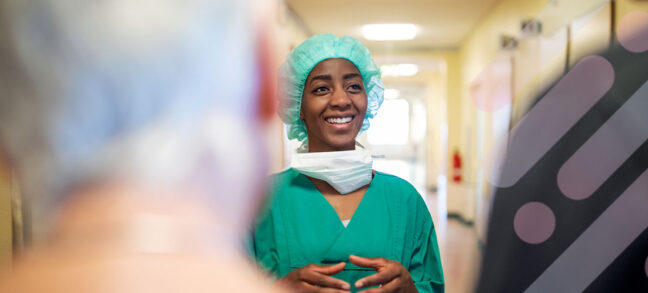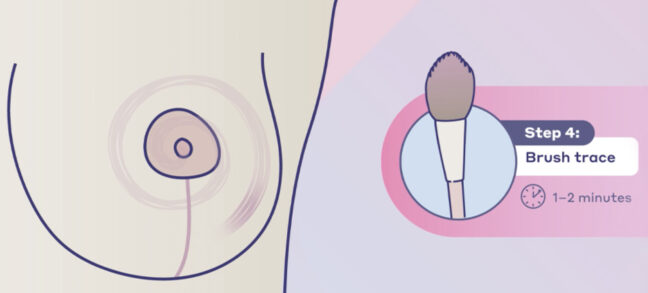Facing a breast cancer or BRCA diagnosis can be an isolating experience. Even though 1 in 8 women will develop breast cancer in their lifetime, it can feel like you’re the only one on this particular journey.1 Even if you’re surrounded by friends and family, it’s easy to think that they can’t possibly understand your experience. While that may be true in many regards, it’s important to remember the positive impact a community of support can have on people who are battling breast cancer.2
Maintaining a healthy social network as you go through treatment and recovery can lower mortality and recurrence rates.3 That might mean leaning on existing relationships with family members and close friends. But it could also mean forging new relationships with women who can truly understand your experience. Fortunately, there are a variety of resources available to help you with the latter.
determine what’s right for you
One interesting note from the scientists who uncovered the benefits of social connections along the breast cancer journey was that relationships are complex.3 To realize the benefits of community support, you should focus on fostering the social ties that are positive for you. But how do you determine what that looks like as you’re considering breast cancer support communities?
These communities come in all sizes, shapes and delivery vehicles, including online forums, one-on-one phone sessions and regular in-person meetings. The form factor alone may help you narrow down which options are best suited to your needs. Maybe you’re not comfortable sharing information on an open forum. Perhaps you feel it’s important to have intimate conversations one-on-one with someone who’s journey closely mirrors your own. Or it could be that you’d prefer physical touch to be a part of your community of healing. There are options that can answer all these needs. You simply have to know what you want and where to look.
We put together the list below to help jump-start your research, and hope it helps you find the support you’re seeking.
online forums and message boards
With a relatively low barrier to entry, online forums and message boards are a popular way to connect with women who are facing the breast cancer battle together. They afford you a certain level of anonymity and give you the opportunity to connect from the comfort of your home, whenever it’s most convenient for you. Plus, it opens up your network to include women from all over the U.S. and possibly the world, improving your chances of finding a group that is a great fit for you.
- FORCE has a number of message boards designed for women facing hereditary cancer risks.
- SHARE and Health Unlocked have partnered to support two online breast cancer communities—one focused on general support and another for those with metastatic breast cancer.
- Beyond the Shock provides a space to ask questions and learn about breast cancer, as well as listen to stories and upload your own.
Facebook groups
Like online forums and message boards, Facebook groups give you access to women from all walks of life, no matter where you are. Many of these groups are private or invite-only, giving you a secure space to share. With groups dedicated to everything from breast cancer and fitness, to humor after breast cancer, to breast reconstruction options, you’re sure to find a group that fits who you are and where you are on your journey.
- Young Survival Coalition offers a private Facebook group reserved for women who have been diagnosed with breast cancer at a young age.
- Komen Breast Cancer Group caters to a broad range of individuals who have been impacted by breast cancer, from newly diagnosed, to long-time survivors, to family members of individuals with breast cancer.
- Beyond the Pink Moon is dedicated to providing support and guidance to those impacted by a breast cancer or genetic risk diagnosis.
- DiepCJourney: Breast Reconstruction after Mastectomy is tied to DiepCfoundation.org. This closed Facebook community focuses on discussing breast reconstruction options with other survivors, plastic surgeons, and health care providers working with those considering breast reconstruction.
mentor matching
For someone who connects better one-on-one than in large groups, a number of organizations provide mentor matching services to connect you to other women who share breast cancer or BRCA experiences similar to your own. These mentor relationships can take shape in a variety of ways—on the phone, by email, in person—whatever is most comfortable and convenient.
- Sharsheret supports Jewish women who face a high genetic risk of breast or ovarian cancer through a one-on-one peer support network.
- After Breast Cancer Diagnosis customizes mentor matches, linking breast cancer survivors and their family and friends with professionally trained survivors and co-survivors.
- Bright Pink partners with Imerman Angels to offer one-on-one support to previvors and women with genetic breast cancer risk markers.
- SHARE offers a helpline designed to connect Spanish-speaking women to peers who have gone through their own breast cancer journeys.
virtual support groups
If you favor a more structured avenue for support, there are a number of organizations that host virtual support groups. These groups typically have regular meeting times and a consistent membership base that can help you forge lasting connections—even if you aren’t able to make it to a physical location. Many of these groups focus on the whole breast cancer journey, but some allow women to connect at specific phases of diagnosis, treatment and recovery.
- SHARE hosts a number of telephone-based support groups throughout the week, with options for women newly diagnosed, women with metastatic breast cancer and young women.
- Cancer Care blends consistency with flexibility, offering a structured, 15-week online breast cancer support group facilitated by an oncology social worker.
- Support Connection facilitates a monthly advanced stage/metastatic breast cancer support group by phone.
local groups
While online avenues and tele-support groups are convenient and give you access to a broader relationship pool, sometimes what you really need is face-to-face connection, a comforting hand on your shoulder and a hug that says, “It’s going to be okay.” That’s where local support groups really shine. Your health insurance company, hospital or cancer care team may be able to point you to groups in your area, or you can rely on one of the national organizations that host groups around the country.
- The Sisters Network supports African American breast cancer survivors around the country through affiliate chapters that host monthly meetings and provide resources to their local communities.
- Face2Face is the local support group arm of the Young Survival Coalition where young women go through each phase of the breast cancer journey together.
- Cancer Support Community, formally known as Gilda’s Club, hosts groups designed to support all individuals with cancer.
- Metastatic Breast Cancer Network has compiled a list of support groups around the country dedicated to supporting individuals with metastatic breast cancer.
get the support you need
While BRCA and breast cancer communities are focused on women supporting each other along a shared journey, ultimately it’s important for you to find one that bolsters you as an individual. Before you jump into any of these communities, do a little soul-searching and make a list of your must-haves (e.g., one-on-one interaction, a focus on your specific phase, faith-based approach, deeper connections). There are dozens of organizations beyond the list above that might be a good fit for you, so review all of your options to find the one where you feel most comfortable sharing and receiving support.
This is not a complete list of all breast cancer support organizations, and this is not an endorsement.
Resensation Articles

How does mastectomy impact the nerves in the breast?
One sometimes overlooked aspect of mastectomy is its impact on nerves. Read what happens to nerves during mastectomy and explore…
Read More
What happens during implant breast reconstruction with Resensation®?
By repairing sensory nerves, Resensation® enables you to potentially regain sensation to your chest. Read how this procedure works during…
Read More
how resensation® helped Leanna feel secure in her family’s future
With Resensation®, Leanna can be there to watch her kids grow up—without losing the feeling of being whole.
Read More
post-surgery sensory retraining: instructions and video guide
Sensory retraining is a series of exercises designed to help you reconnect with your body after breast reconstruction with Resensation®.
Read More